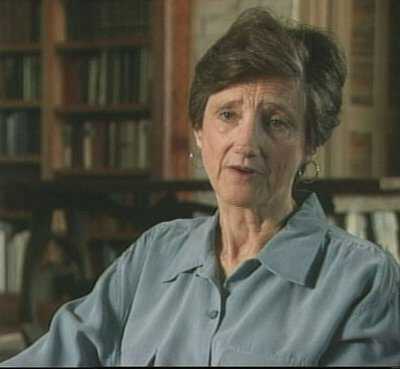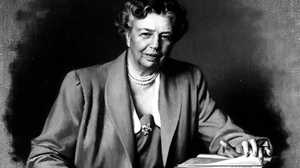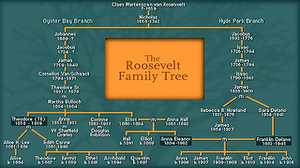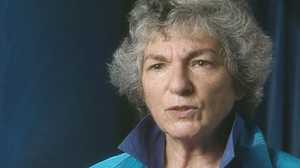Nina Roosevelt Gibson
American Experience interviewed Eleanor Roosevelt's granddaughter, Nina Roosevelt Gibson, in 1999. Below, read excerpts from her interview.

Describe the family that Eleanor was born into?
My grandmother was born into a family of privilege. There's no doubt about that. Everybody's role was absolutely laid out in stone, and expectations were very clear. People knew what they were supposed to wear, what they were supposed to do, what they were supposed to talk about, what they weren't supposed to talk about, what they were going to be when they grew up. I mean, little girls became social butterflies, became mothers and ran a household and continued in a very social kind of a lifestyle. Most of the people in that class had access to wealth and to all of the comforts that others in this country at that time didn't have. They were a very elite group of people in their own way. And so my grandmother started her life on a path that wasn't meant to have any deviation whatsoever.
Do you think she escaped from the difficulty of her life in her books?
After the death of her parents, she went to live with her grandmother in Tivoli. Her grandmother had several other children who were young adults, very busy, very social, and in a sense, a handful. So my great-grandmother, I believe, didn't have a lot of time to suddenly devote to two small grandchildren. So I believe, and from the stories I've heard, that my grandmother's life at Tivoli was somewhat isolated and lonely. And I know that as a child, she found great solace in reading, because even she would tell me when I was growing up that reading could bring you lots of friends that you didn't have. And she even signed me up in a book club when I was quite young, and it continued until into my teenage years, because books had been so important as friends to her, that she was imparting that to me as a grandchild.
Franklin's Attraction to Eleanor
What do you think Franklin saw in her that attracted him?
I think Franklin Roosevelt saw a young woman that he knew he was related to. He knew that he'd met her years before, but he really didn't know her. And when they were in their late teens, and my grandmother was going through the debutante part of her life, they re-met at social events, at dances, balls. And Franklin Roosevelt apparently was fascinated by the fact that this was a woman who was seeing things that he had never seen in his own back yard. This was a woman who thought about things, who had opinions, who had developed an intellect, was well read and wasn't afraid to talk about her opinions and her feelings about the books or whatever that she had read. And this was quite uncommon for many of the young women that FDR had known. So she was kind of different. And I think she was very lovely. I don't see her as the ugly duckling at all. And I'm sure he didn't either. She wasn't the light, funny, socialite that people expected he would be interested in. But I think there was a piece of FDR, a very large piece, that was far more interested in the realities of life and in what was going on around him. And so meeting my grandmother, I think he became very attracted to this woman who was so different.
Franklin's Social Interests
Franklin Roosevelt, from what I understand, always loved to be around people who liked to laugh, who liked to have fun. He loved having fun in many, many different ways. He enjoyed his cocktail hour. He loved good gossip. He enjoyed poker games. He enjoyed all kinds of things that my grandmother really didn't enjoy. My grandmother had come from an alcoholic family, and she didn't enjoy cocktails. She would, as the hostess, drink a little bit of sherry, but that was all. She served wine with meals, but she didn't really approve of a lot of alcohol. And she was a more serious kind of person. It was harder for her in even small groups to let her hair down, so to speak, and to laugh. Gossip wasn't something she enjoyed. And I think, when she was with a small number of people that she was very comfortable with, then I think she did have a playful side. And she did have a playful side when I knew her. We went on picnics and had lots of times that were fun. But they weren't raucous rough-housing kind of fun, the way Franklin enjoyed. And Franklin liked to be the center of attention. And my grandmother truly didn't.
Eleanor and Franklin's Children
Do you think the children resented the fact that their parents were so busy?
The children, I believe, had to make quite a few adjustments to the fact that their parents were both very busy and not home on a consistent basis. Again, they had a grandmother who was consistently available to them. Their household ran smoothly. So that the children had a sense of stability, and they knew in terms of the household what was happening. What they also learned very early on was how to drive wedges between their parents and their grandmother, to get what they wanted from their grandmother when they couldn't get it from their parents. And I think it was probably harder on the younger of the five children, because by the time, for example, my father was six or seven, he really did not see his father very much. His father had contracted polio when my father was five. So after the polio, FDR spent a tremendous amount of time working on recovering and getting back the use of his legs, and then went right from that endeavor into a very active political life. So my father probably had a more difficult time than some of his older siblings.
Talk about the children learning to drive a wedge …
As an example of the children learning how to manipulate their parents and grandmother, my father, when he was in college, he crashed a car. He totalled the car, but my father was fine. He came home and told his parents what had happened. His parents both said, "Well, as long as you're okay, that's wonderful. But there's no new car on the horizon." And my father realized that his parents meant that; that they were not going to buy him another car. So he went and found his grandmother. My father at this time was about 6'4" and not terribly heavy, but he was a big man. And he went and sat on his grandmother's lap, called her Toots, and within ten minutes had a new car.
Eleanor's Mother-in-law, Sara Delano Roosevelt
Talk about the dynamics between Sara, the children, and the parents.
My father and his siblings were quite spoiled by their grandmother. And again, I believe perhaps the elder siblings were even more spoiled than my father and Uncle Franklin, the younger ones. But when my father or any of the children would suggest that it would be lovely to have a horse or a pony or whatever, then suddenly one would appear in the stable in Hyde Park, and the children would have access to practically anything they wanted. And this was never discussed with the parents. It was just provided for by Sara Roosevelt.
Why did Sara do that?
I don't believe Sara was trying to drive a wedge between her grandchildren and their parents. I think she felt, as the grandmother, that this was her right to spoil the children, and that they weren't really being spoiled. And as long as she could provide these lovely things for her grandchildren, she was going to.
She controlled Franklin and Eleanor, didn't she, because she held their purse strings?
Sara Roosevelt held the purse strings for the entire family. So that when my grandparents reached the time when they needed their own house to live in, it was Sara Roosevelt who purchased the house. The dynamics between Sara and her own son were that Sara's decision on where they should live was fine by him. Franklin never seemed to object, and my grandmother, feeling that it was her role to just go along with it, went along with it.
Coping with Franklin's Polio
Summarize the devastating work it took to cope with Franklin's polio.
My grandmother was suddenly, practically overnight, faced with the feeding and caring of five children, the just day-to-day taking care of children who suddenly realize their father is very ill, and they're scared, they don't know what's happening. My grandmother is scared. She's not sure what's happening. She's waiting for expert doctors to come. And here's a man who's in agony with every move, if he could even move. So it was left to my grandmother to nurse him continually. My guess is that he wasn't able to sleep a lot, and he would wake up and be in pain. And my grandmother, of course, was right next to him. She slept in the room on a cot. She would then have to literally help him, if he was going to try and sit up, or help him when he needed to use the bathroom. Just the everyday kinds of things that we're used to doing. She brought him his food. He didn't feel very well, so I'm sure he didn't eat much. So she was trying to help him eat, because she knew that that was important, no matter what. And at the same time, she has five children who are saying, "What's wrong? What's wrong?" And, "What are we going to do today?" And, "There's nothing to do." The same kinds of things that any five children would be worrying about and thinking about when they're on summer vacation.
How did the polio affect the children?
I think, from what I've understood, at first the older ones were a little bit afraid because they'd never seen their father ill before. They knew something terrible was happening because he wasn't getting out of bed and he wasn't his boisterous self. And they were kept out of the room so that he could rest. And that had never happened. They usually had pretty free access to their father. And this was the summer home, the place where they played with their father all the time. That's a pretty scary thing for any child. So I'm sure that even for my father, who was only five– he knew something was wrong. He probably wouldn't have been able to articulate how he felt about it, but it would have been a very scary kind of thing for any child, and particularly in this setting, which was: This is where the family played and did things together, went on hikes, went on picnics, went sailing, did all kinds of things. And suddenly their father's confined to this bed. And they know he's in pain, and they know that he's very, very ill.
The Children's Troubles in Later Years
Summarize the children's troubles in their later years, and tell why it was so hard for them.
The children of Eleanor and Franklin Roosevelt certainly had many troubles in their lives. Many of them were married several times, and they had scattered families. And I think it was very difficult for them, as the children not just of the president of the United States but of Eleanor Roosevelt as well. They sort of had a double whammy, because my grandmother was prominent and history will put her down as one of the greatest women who ever lived, I believe. So I think it was very difficult for them. I know for my father, who was the youngest, it was difficult because when he was a young boy, his parents were so busy that they weren't able to spend a lot of time with him. So he grew up pretty much on his own. And then as an adult, he had many people who tried to get him to come into one business scheme or another because they thought that it would lend credence if they had a Roosevelt name attached to the business. And unless you're pretty sophisticated, you know, you get all excited about those kinds of things. And my father was fortunate in that he didn't get involved in very many of those kinds of things, and he worked his way up the ladder. He started in the basement of Filene's Department Store, and then continued until he eventually became an investment banker. So in a sense, he was lucky. And I think Uncle Franklin also. He had a wonderful career, but I think for some of the others, it was very difficult to know who they were in relationship to their parents, to their own families, and to the people that were perhaps not always scrupulously trying to use them.
What Her Grandmother Meant to Her
Tell about what she meant to you as a grandmother.
To me, my grandmother was the most important person in my life. And I for a long time had no idea that she was famous. So as I reflect back and realize that at the time she was giving me a lot of personal time, she was a very busy woman. And I didn't really know it, because I was pretty naive. And she was so important as a grandmother partially because, for me anyway, my own parents were difficult to raise. They had a view of children that I didn't really fit into. I was a sickly child on a number of occasions. I was very shy. I was very withdrawn. My mother, like my great-grandmother, had hoped for a daughter that would be beautiful and very social, and I just wasn't those things. So my grandmother was the one that I turned to for love, for support. Not that my parents didn't love me. They did. But for additional love and support. And my grandmother was always there. I spent many nights in her house as opposed to my own, which was right next door. And I was particularly fortunate because I lived right next door to my grandmother my whole life. I grew up at Val-Kill. And then when I was in New York City, I was welcome in her apartment at any time I wanted to go. And I knew that, and I took advantage of it for sure. I was at her house frequently. And she took me on trips, and we had a lot of fun together, as well as I learned a tremendous amount on those trips from her. And she took time to teach me. It wasn't that I was learning by osmosis. She took the time to teach me a lot of things. And my parents at the time just were unable. They had, you know, four children, and my sister died, and that really kind of took quite a while for my parents to adjust to that loss. And so my grandmother became for me, you know, a tremendous mainstay.







